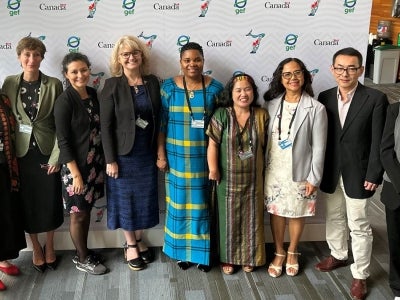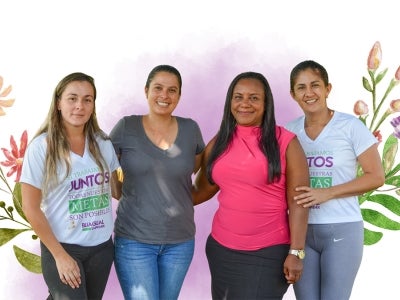On International Women’s Day, GEF CEO Monique Barbut says environmental and sustainable development programs must Account for special needs, Contributions of Women in Developing World

gnanian-woman-HP_0.jpg
WASHINGTON, March 8, 2012 – Environmental programs and initiatives must take into account the special burdens and contributions of women throughout the developing world, the head of the Global Environment Facility said today.
Celebrating International Women’s Day, Monique Barbut, CEO and Chairperson of the GEF, said that sustainable development and environmental protection efforts cannot succeed without attention to gender and without the active participation of women. For that reason, she said, the GEF has designed programs paying attention to the relationship of women to the environment of developing countries.
"Issues of gender equality are an integral part of the work we do at the GEF. Many of our environmental initiatives seek to redress the special burdens borne by women in the developing world -- the hours spent hauling water, the raising and harvesting of crops by hand," said Barbut.
"The GEF designs and supports environmental programs that expressly take into account the concerns and needs of women throughout the developing world, those whose voices are seldom heard, who silently suffer, who fight for their freedom and their livelihood,” Barbut said. “Today, on International Women's Day, we at the GEF say that women are our concern every day."
Women, while sometimes the ‘victims’ of environmental degradation, also serve as the ‘agents’ for change and improvement in environmental and economic conditions, according to Barbut. In the developing world, women are often the managers and caretakers of the local environment and natural resources such as water and fuel.
GEF Gender Policy
The GEF, the world’s largest multinational funder of global environmental projects, builds gender-specific goals and criteria into the programs it funds on a range of issues, from climate programs to coastal protection to efforts to prevent land degradation and deforestation.
The GEF Council last year approved a Gender Policy directing that women be consulted and involved in every step of the project cycle from development to implementation and evaluation. The policy is titled, Environmental and Social Safeguard Standards and Gender Mainstreaming. It calls upon the GEF and its agencies to mainstream gender into their operations and increase efforts to address the specific needs and roles of men and women.
Gender Mainstreaming at the GEF
The practice of gender mainstreaming at the GEF involves the recognition of the distinct contributions of women and men. Policies and programs that ignore the differential impact on gender groups are often gender blind and potentially harmful for human development. In projects, gender mainstreaming includes identifying gaps in equality through the use of gender-disaggregated data, developing strategies and policies to close those gaps, devoting resources and expertise for implementing such strategies, monitoring the results of implementation, and holding individuals and institutions accountable for outcomes that promote gender equality.
For project interventions to achieve global environmental objectives, the GEF focuses on enhancing both women’s and men’s contributions, taking into account their different needs, roles, and situations in every step of the project cycle. The GEF’s Public Involvement in GEF-Financed Projects policy relates directly to social issues, including gender, and provides the basis for public involvement throughout the project cycle.
Below are examples of GEF programs that place special emphasis on gender issues and the concerns of women in connection with the environment. For more information, visit www.TheGEF.org :
- In Rwanda, a GEF funded project recently visited by U.S. Assistant Treasury Secretary Marisa Lago supports an initiative by local women in Kigali to develop alternative energy sources to wood fuel as a response to climate change and deforestation. Most of the 150 members of the organization, called COOCEN, are women, some of them former sex workers. At their own initiative, the women have been collecting garbage and using it to fabricate fuel briquettes. The program is providing much-needed income while also avoiding the burning of some 1,200 tons of firewood per year.
- The Least Developed Countries Fund (LDCF) and the Special Climate Change Fund (SCCF) take a proactive and systemic approach to gender issues in climate change and adaptation. Climate change adaptation helps developing countries cope with the immediate impacts of global warming such as desertification and land degradation. As of 2009, more than half of 39 completed National Adaptation Programs of Action in LDCF countries specifically identified environmental impacts on women and recognized them as a particularly vulnerable group. SCCF supports activities including water resource management, agriculture, health and infrastructure development. Many of these programs lead to improvements that free women from manual toil that consumes most of their waking hours.
- The Namibian Renewable Energy Program addresses gender equality and women’s empowerment in energy-related projects. Half the participants in the community management portion of the program and one-fourth of the technician trainees are women. In addition to the employment opportunities for women generated by the program, women benefit from improved security conditions at night through the availability of modern street lighting.
- A program in Ghana supported by the GEF Small Grants Program assisted a rural traditional area in the Upper West Region. The small community suffered elevated levels of disease such as diarrhea and dysentery due to poor access to potable water and poor sanitation. Women and children spent four hours per day on average fetching water from a source two miles away. The project introduced low-cost and affordable technologies for supplying potable water. Overall health conditions have improved and women have more time, and more readily available water, for increased production of shea butter to meet export demand.
- A biodiversity project in Peru aims at protecting globally important ecosystems recognizes the important role of women, particularly indigenous women, in achieving outcomes through gender-sensitive strategies. Increased participation by women in planning, managing, monitoring, and evaluating the protected areas is a foundation stone of the project. The Gender Strategy features innovative leadership allowing equal participation in decision-making. The project employs female protected areas specialists to address local women, including indigenous women, through special training and communication strategies. In parallel, it will strengthen women’s organizations, and finance and provide technical assistance and training to women’s initiatives on sustainable use of natural resources.
- “Enabling Sustainable Dryland Management through mobile Pastoral Custodianship” involves nine countries, Argentina, Benin, Burkina Faso, Iran, Kyrgyzstan, Mali, Mauritanian, Morocco, Tajikstan in an effort to remove barriers to sustainable pastoral practices. A global Gathering on Women Pastoralists was organized to foster learning exchange between different participants and produced a “Women Empowerment in Pastoral Societies” publication in 2008.
- In the Danube River Basin, a project in Serbia to reduce nutrient flows into the watershed includes an information campaign that differentiates views of men and women on the key issues at hand. Farms and slaughterhouses are directly involved in project implementation through sub-projects. Agricultural advisors offer training and technical assistance to farmers to design farm manure management plans and a public information campaign, while incorporating gender analysis in both. The public information campaign is adjusted according to annual public opinion polls to most effectively reflect gender-specific differences in views on how nutrient pollution from livestock farms and slaughterhouses impacts human health and aquatic biodiversity. Analysis suggests that there is higher awareness among women than among men of pollution from livestock farms.
Here is the link to the GEF policy:
/gef/C40/environmental_social_safeguards_gender_mai...
Best practices and quick facts are highlighted in the following documents:
• Mainstreaming Gender at the GEF
• Gender in LDCF and SCCF
• GEF Gender Fact Sheet
Contact:
Mr. John Diamond
Senior Communication Officer | Spokesperson
Phone +1 202 458 7953
E-mail: jdiamond@thegef.org
Press Release No. 2012/4
###
The GEF unites 182 countries in partnership with international institutions, civil society organizations (CSOs), and the private sector to address global environmental issues while supporting national sustainable development initiatives. Today the GEF is the largest public funder of projects to improve the global environment. An independently operating financial organization, the GEF provides grants for projects related to biodiversity, climate change, international waters, land degradation, the ozone layer, and persistent organic pollutants.
Since 1991, GEF has achieved a strong track record with developing countries and countries with economies in transition, providing $10 billion in grants and leveraging $47 billion in co-financing for almost 2,800 projects in over 168 countries. Through its Small Grants Programme (SGP), the GEF has also made more than 13,000 small grants directly to civil society and community based organizations, totaling $634 million. For more information, visit www.thegef.org.
Stay Connected
Media Contacts
Alexandre Pinheiro Rego
Senior Communications Officer
arego@thegef.org
GEF Secretariat
1899 Pennsylvania Ave, NW
Washington, DC 20006 USA
communications@thegef.org

